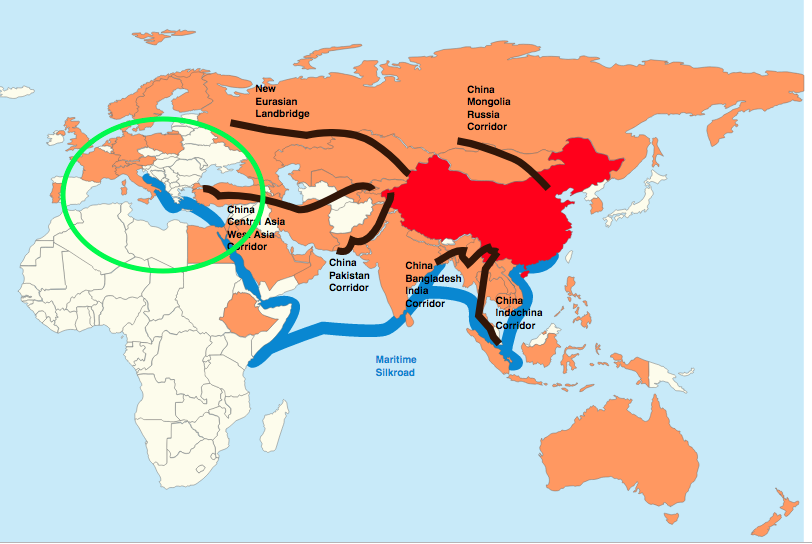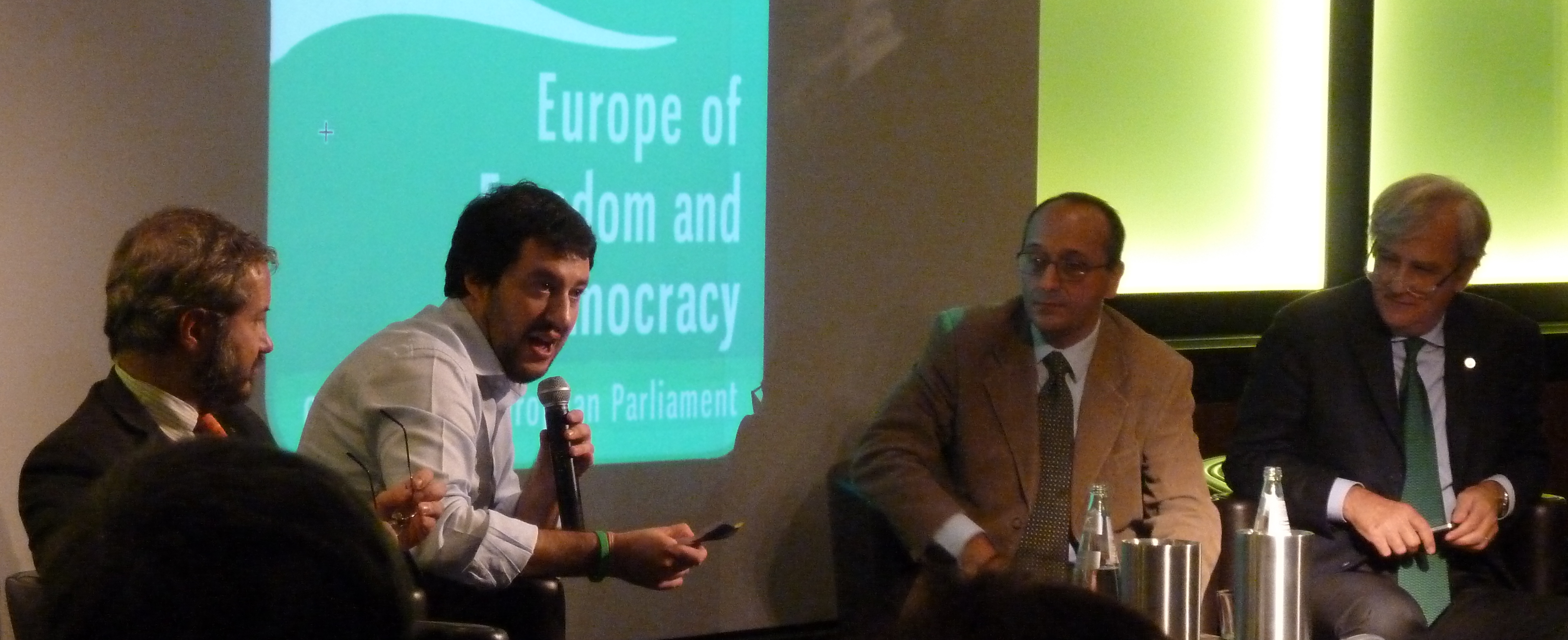The U.S. and EU may worry about Rome joining the New Silk Road, but it’s their fault, writes Andrew Spannaus.
By Andrew Spannaus
in Milan
Special to Consortium News
 Italy caused a political firestorm in mid-March when it announced that it would be joining China’s Belt and Road Initiative by signing a memorandum of understanding during Chinese President Xi Jinping’s visit to Rome from March 21 to 23.
Italy caused a political firestorm in mid-March when it announced that it would be joining China’s Belt and Road Initiative by signing a memorandum of understanding during Chinese President Xi Jinping’s visit to Rome from March 21 to 23.
As the first G-7 country to accept a formal agreement to participate in the initiative, also known as the New Silk Road, Italy found itself under instant pressure from both the United States and its allies in Europe, all of which worried that it represented an expansion of China’s economic foothold in the West.
The populist government led by the Five-Star Movement and the League was caught off guard by the rapid backlash, which began with a pointed tweet from the U.S. National Security Council on March 9.
Italy is a major global economy and a great investment destination. Endorsing BRI lends legitimacy to China’s predatory approach to investment and will bring no benefits to the Italian people.
— NSC (@WHNSC) March 9, 2019
Garrett Marquis, confidant of U.S. National Security Adviser John Bolton and former Security Council spokesman, followed up with a threat to stop intelligence-sharing between the two countries.
Prior to the Chinese leader’s arrival, Giancarlo Giorgetti, the secretary of the Council of Ministers, a post equivalent to chief of staff in the U.S., confirmed the signing of the memorandum to exploit new economic opportunities, but said important restrictions would be placed on cooperation with China, and that it was “ridiculous to speak of detachment from the United States.”
The government also took practical measures immediately, expanding the scope of the “golden power,” the government’s ability to veto economic operations that it deems a threat to national security. This is aimed in particular at protecting the telecommunications sector and the development of the 5G mobile network, an area where the Trump Administration is putting pressure on other European countries as well.
On March 25, by the time Xi Jinping had come and gone, Deputy Prime Minister Matteo Salvini said “I think the proper balance has been reached. … Nobody should see this as a change in course, or a change in strategy internationally. Italy remains where it is.”
Nonetheless, the China Daily is calling it a “milestone in cooperation” and plenty of news outlets are underscoring the significance of the deal, which starts at $2.8 billion and could expand to $22.6 billion.
Michele Geraci, undersecretary of state at the Italian Ministry of Economic Development, who led negotiations on the deal, has insisted that despite taking into account U.S. and EU worries, Italy must make its own decisions, following an “Italy first” strategy.
But Salvini, to whom Geraci owes his position, and who is poised to have even more clout after the European elections at the end of May, has been clear that it is not the type of change in alignment the Chinese had trumpeted.
Salvini even stayed away from the state dinner with Xi; and he has vowed to use his position as interior minister to monitor national security as regards port infrastructure. The other deputy prime minister, Luigi Di Maio, who met with Bolton last Thursday in Washington, says that while Italy is simply pursuing its economic interests, it remains a key NATO ally and trade partner. This is Italy’s standard posture, which will likely be accommodated as long as the government responds to specific requests from the U.S., as it already has, for example on 5G, the new telecommunications infrastructure.
Larger Partnerships
Italy is certainly not the first country in Europe to look to China for economic growth opportunities. Its larger neighbors in the European Union (EU) actually do more business with China, and have established themselves as key partners in the BRI.
Germany exports 94 billion euros worth of goods to China, for example, while the United Kingdom and France come in at 23 billion and 21 billion, respectively. Italy’s share is currently only 13 billion.
After his visit to Rome, Xi Jinping was welcomed to Paris, where he signed agreements for the purchase of tens of billions of euros of French products, from airplanes to wind power systems, despite not formally joining the BRI. And the German city of Duisburg has become a key terminal for the Chinese initiative, with the arrival of dozens of trains every week that carry goods to be distributed throughout Europe thanks to the city’s central position and infrastructure connections.
Critics of these agreements point to two negative effects of Chinese expansion: cheaper products that undercut European producers, costing manufacturing jobs, and growing Chinese ownership of assets in Europe, giving the Asian giant increasing power over Western economies.
Other European countries, such as Portugal and Greece, have signed formal agreements with China regarding the New Silk Road. Italy is different because it has a much larger economy, and is a member of the G-7. Yet it shares the need to rebound from the economic collapse suffered in recent years during the Euro crisis. These have been aggravated by the neoliberal policies imposed by the European Commission and the European Central Bank, with the assistance of the International Monetary Fund.
Between 2011 until 2014, during EU-dictated austerities, Italy’s GDP declined by 7 percent, with the loss of 20 percent of the country’s industrial production.
It’s been a disaster from which the economy has only partially recovered. The current government is attempting to reverse the situation, with greater social spending and public investment. But lacking many allies in Europe, it’s being forced to compromise with EU institutions and scale back on its plans.
So, it’s no surprise that Italy would look to China to help jump-start the economy. And given that other European countries have more trade with China, it’s reasonable to expect Italy to make up the gap with countries such as France and Germany, both through investment in private enterprises and the construction of public infrastructure. And the Italians are seeking more opportunities for their companies to sell products in China.

BRI’s six proposed corridors, with Italy circled, on maritime blue route. See Wikipedia’s “Belt and Road Initiative” entry for more details. Map not meant for latest national boundaries.(Lommes, CC BY-SA 4.0, Wikimedia Commons)
Larger Problem for West
Italy’s situation reflects a larger problem for the West. The neoliberal economic policies of the past 30 years have brought the outsourcing of well-paying jobs, and a reduction of the role of the state in both stimulating growth and guaranteeing the welfare state. This has weakened the middle class and widened inequalities. As this has happened, the West has lost economic and political weight, opening the door for new powers to expand. China has been the main beneficiary, considerably increasing its economic presence in areas such as Africa and Latin America, and now aiming to play a leading role in Europe as well.
This shift worries U.S. government institutions seeking to bar China from such strategic sectors as telecommunications and to maintain close military-industrial cooperation with European allies.
The strong negative reaction from the U.S., followed by the European Commission, may have been driven by China’s public relations about the deal and in part by the make-up of the Italian government.
China portrayed it as a major step, not just another agreement with one country among many in Europe. The Chinese press hailed the accord as a step forward in a “comprehensive strategic partnership,” and published remarks calling it an “antidote to the rising wave of unilateralism and trade protectionism,” a clear dig at the U.S.
Xi Jinping then wrote a long article published on the front page of Italy’s leading daily, Corriere della Sera. Meanwhile, on the day of Xi’s arrival, copies of the official China Daily were distributed free to numerous hotels around Rome.
All that contributed to the unease, and key players in the Italian institutions quickly decided they could not afford to anger the United States. The memorandum has been signed, and Italy will try to obtain as much economic benefit as possible, attempting to make up ground compared to its European competitors. However, the document, and the government’s rhetoric, have been adjusted to dampen the notion of a change in Italy’s strategic positioning.
Italy has the only fully populist government in Europe: the Five-Star Movement and the League came to power after elections one year ago, determined to challenge the status quo, meaning going against EU economic orthodoxy, and also hoping to lower the tensions that have dominated relations with Russia in recent years.
The Trump administration has generally been supportive of the Italians, while other European governments have not. Thus, the desire to accelerate cooperation with China is now being tempered by the need to maintain the full support of the country’s most important ally.
Andrew Spannaus is a journalist and strategic analyst based in Milan. He was elected chairman of the Milan Foreign Press Association in March 2018. His latest book “Original Sins. Globalization, Populism, and the Six Contradictions of the European Union” is due out at the end of April.
If you value this original article, please consider making a donation to Consortium News so we can bring you more stories like this one.
Please visit our Facebook page, where you can join the conversation by commenting on our articles to help defeat Facebook censorship. While you are there, please like and follow us, and share this piece!



Note the impeccable example of continuous and pernicious projection by the US of its own motives and techniques onto others revealed in the tweet of the warm, cuddly and so…ooo democracy-promoting NSC: “… China’s predatory approach to investment and will bring no benefits to the Italian people.”
The US spent decades, multi- $trillions and tens of millions of lives to convert China (USSR/Russia ditto) to capitalism. With that expensive and bloody battle won, the US, characteristically, is simply not satisfied.
China has proven itself, economically, at least the equal to the US, and pulling away … without having to resort to the global bully’s >$trillion/year military intimidation/enforcement system of bases/troops/ and wars across the globe.
Yes, under the current US administration and to their own detriment, strategic partnerships like this one will continue.
Nationalism supports Isolationism, and it’s consequences will affect more than just the US economy.
The ‘ art of the deal ‘ is part and parcel of Chinese business, has been for thousands of years.
Shame that the current president doesn’t get it.
It’s nice to see the american empire going down(if that’s what is actually happening). But replacing american crony capitalism with chinese crony capitalism isn’t exactly an impressive change or much of an improvement.
I am proud of Salvini for using his brain. The next step appropriate step for Italy us leave the EU and NATO.
Garrett Marquis is on the wrong side of history.
Roberto – if Italy leaves the EU it leaves the Euro. Do you imagine any investor, large or small, in the world would invest in the Lira?
What is most troublesome about the US posture is its unyielding my way or the highway approach to international relations. Any attempt to do otherwise is met with a firestorm of criticism and threats. Trump talks to Putin and its treason. Obama came up with the pivot to Asia to create and alliance to stop those evil Chinese and there’s approval.. Italy deals with China and gets threats from the like of Bolton.
You have a president trying to act like a wall street speculator with such actions as trying to thwart the flow of natural gas from Russia to Europe and trying to stop Huawei from selling is 5G stuff.
Sadly, their approach may prevail and it will cost lives and fortune and the world will be worse off for it. Somehow, those forces that are behind this mess have to be overcome.
Have to say Tulsi Gabbard’s comment about getting the collusion hysteria behinds us dealing with real issues was refreshing. She done a couple of things that suggest she has a different and healthier view of international relations.
“The U.S. and EU may worry about Rome joining the New Silk Road, but it’s their fault”
While this captures some truth, I think something important is revealed in the language.
Talking about someone’s “fault” in this context is inappropriate.
China’s development is a natural evolution, part of an ever-changing world.
And new connections forming between a country like Italy and China is also natural, and I think inevitable.
Thinking in terms of “faults” does to my mind reflect some residual of the very American and European thinking the author criticizes.
The US Empire time has come, and China will be the stake to the heart of the Imperialist hegemony borne out of WW II. How ironic that the US capitalist class wanted to defeat Communism in Russia and China and they “succeeded” just to see China beat them at their own game…..goes to show you that no matter the economic system at play the US Empire and the Imperialist class and their “republicans” and “democrats” politico vassals always want to run the show to the detriment of everyone else in the world…..
Italy is making the choice of choosing the BRI Hand up, not a hand out & accepting China’s rising clout as a Trading Superpower over the Vassal European EU states & their poisonous US Imperial model of Neoliberalism, endless Wars & chaos model. The EU’s austerity policies have been catastrophic for Italy & Greece & others & these Nations are now saying enough of this nonsense, we are going to form alliances with China because the EU & its puppet master, the American, Soprano Empire has nothing to offer but bankruptcy; deprivation & death! So long EU & shabby US Empire, Italy is entering the onramp to China’s Belt & Road Superhighway to the Future & leaving the US Empire of Chaos & the EU Imperial vassals in the rear view mirror where they belong? And Italy is only the beginning as other Nations will join the BRI to the detriment of the Empire & its cronies!
The EU has absolutely nothing to offer the southern European countries, on the other hand the interchange of goods that the new silk Road we’ll offer all players will truly be win-win. May the Chinese continued to burn down the American telecoms.
For the international order to chose between BRI and the violent US Empire designs is like comparing life over death. People want the positive as the world has dwelled too much on the negative. All this chaos to prop up a Military Industrial Complex will be what brings down the mighty USA dominated empire down. Funny thing of how the Chinese BRI resembles so much the US Marshall Plan. Once again the USA will be blindsided by its own MIC hubris.
The US is still the puppet master. The vassal states in Europe still take their cues from their overlords in Washington. Italy broke ranks (and I wouldn’t be surprised if Greece followed suit) because the south of Europe has been hammered much worse by the US/EU neoliberal regime and the complete failure of the US to responsibly manage its currency. Let us be clear. There was no “Euro” crisis. There was a dollar crisis originating in the US that spread around the world.
Let us also be clear about the kowtowing to the US. Europe will lose by doing this. Heiwei is well ahead of the US on 5G. What that means is that if you sign-up for Trump’s America first 5G you’ll get the technology later, at a higher cost, and it will come with backdoors so that the NSA can break in anytime it wants, something you’ll probably be immune to with Heiwei.